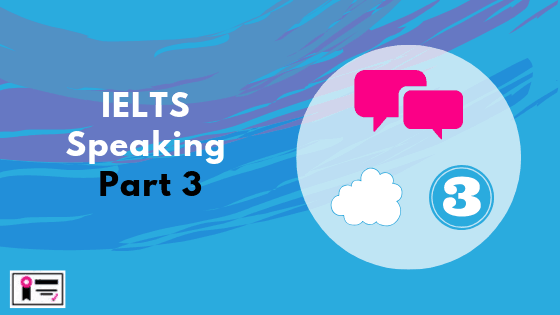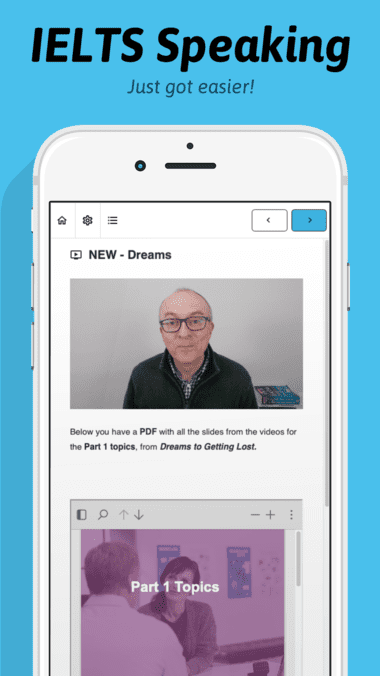IELTS Speaking Part 3

Table of Contents
What happens in IELTS Speaking Part 3?
After you have finished your ‘long turn’ in Part 2, the examiner goes on to ask you more questions on a topic related to Part 2.
For example, if your Part 2 question was –
Describe a time someone helped you achieve a goal
In Part 3, you may discuss more about
- setting goals
- reaching goals
- being successful
- motivation
- motivating children and adults to learn
IELTS Speaking Part 3 is your chance to really show off your ability to use English flexibly to discuss a topic in detail and in depth. You will be expected to use a variety of more complex functions such as speculating, evaluating and justifying ideas and opinions.
Unlike IELTS Speaking Part 1 and Part 2, this part is not really about you and your life, but rather about more abstract and general ideas.
Watch this video for more tips and examples of how to answer Part 3 questions
How long is IELTS Speaking Part 3?
IELTS Speaking Part 3 lasts 4 to 5 minutes. The examiner will usually aim to ask around 4 to 6 questions.
Some of the questions are scripted, but the examiner may also ask some impromptu (made up) questions based on your last answer.
You need to give longer answers than in Part 1. Your answers may last between 30 to 60 seconds.
Tips for answering Part 3 questions?
In Part 3 comes straight after Part 2 and you have no time to relax, so it’s essential you stay calm but keep focussed.
In order to answer Part 3 questions effectively, you need to give longer answers and develop your ideas.
To develop your ideas there are different approaches, but my favourite is to follow these 3 steps (O.R.E.) and give your,
- Opinion
- Reason
- Example

So, let’s say the examiner asks
How have newspapers changed in recent years?
You might say,
Well, I’d say the biggest change is that they have moved online (opinion)
Because they have had to keep up with social media as a means of spreading news (reason)
For example, I used to read the Guardian newspaper, the paper version, but now I read it via their app on my mobile phone (example)
This kind of structure will help you develop your topics for better fluency, and also develop more complex structures (by having more clauses) and so produce higher level grammar.
You can extend this idea and also add a 4th step (O.R.E.C.), giving your,
- Opinion
- Reason
- Example
- Consequence

You answer might now be,
Well, I’d say the biggest change is that they have moved online (opinion)
because they have had to keep up with social media as a means of spreading news (reason)
For example, I used to read the Guardian newspaper, the paper version, but now I read it via their app on my mobile phone (example)
I think, by moving online, the big newspapers have been able to actually grow their readership (consequence)
Part 3 sample questions
It is impossible to know what questions you will get in IELTS Speaking Part 3 because it is more of a natural flowing conversation. At times, the examiner may make up questions, reacting to what you have said.
At the same time, it is useful to be familiar with the kinds of questions you may get in Part 3.
Here are some examples of the kind of IELTS Speaking Part 3 question types you might hear.
QUESTIONS
- How has ___ changed in recent years?
- How will ___ change in future?
- How could we make ___ better?
- Why do people do ___?
- What are the advantages and disadvantages of ___?
EXAMPLES
- How has shopping changed in recent years?
- How do you think the family will change in future?
- How could we make our cities better?
- Why do people throw rubbish on the streets?
- What are the pros and cons of globalisation?
IELTS Speaking Part 3 topics
Part 3 will have the same topic as Part 2, but you will talk in more depth, developing the topic and going into some detail on various sub-topics.
Here are some of the kind of common Part 3 topics with possible sub-topics you should be prepared to talk about.
Click on the topic title to get a IELTS Speaking lesson to help you prepare for the test.
Wild animals, hunting and extinction, zoos, pets, animals in research
Exhibitions, modern art, role of art at school, museums, digital art, art at home, graffiti
Reading for pleasure, novels, digital books, online book shops, books and learning
Play, games, toys, behaviour, obeying parents, study
Traffic, city planning, city versus countryside, advantages, pollution, noise pollution, green spaces
Fashion, buying online clothes, clothes industry, brand names
Teachers, learning, online learning, preparing for work, skills, universities, sciences versus humanities
Global warming, pollution, animals becoming extinct, wildlife protection, deforestation, companies responsibility, individual versus government role
Family structure and size, role of grandparents, care of the elderly, relationships, extended family
Restaurants, diets, fast food, healthy eating, obesity, food and children, GM food, supermarkets
Exercise, diet, gyms, routines, obesity, disease, corona virus, stress
Helping others, charities, fund-raising, skills needed, helping poor countries, international aid
Buying and renting homes, types of accommodation, children leaving home, decorating homes, local community
Popular jobs, future jobs, atmosphere at work, motivation, training
Modern versus traditional, national anthems, style and genres, live concerts, listening to music, being a musician
Local versus international, online news, newspapers, reliability, fake news, getting news, family news, journalism
Taking photos, storing photos, photos as an art form, photos at home, professional photos, selfies
Branches of science, science in everyday life, disease, research, food science, nuclear power, space exploration, the planet
Real shops versus online shopping, payments, men and women shopping, habits, fashion, local shops versus shopping malls
Fitness, gyms, benefits, equipment, extreme sports, Olympic Games, international competitions
Artificial Intelligence, the Internet, safety, computers, mobile phones, stress, robots, social media
Benefits, challenges, competition, children, teamwork at work, international competition in trade
Public versus private, advantages and disadvantages, transport in the future, electric cars,
Forms of transport, global warming, holidays, tourism, eco-tourism, travel abroad versus domestic, safety
Global warming, seasons, extreme weather, impact on life, weather forecasts
Popular jobs, jobs for the future, robots, salaries, men-women equality, work-life balance
How to prepare for IELTS Speaking Part 3
You need to get lots of ideas and plenty of rich language in order to be well prepared for Part 3.
A good way to do that is to listen to a wide variety of podcasts, and watch videos and films, so you are exposed to English being used in lots of different contexts.
____
Read: List of Podcasts and Useful Listening Materials
____
Keep a list of vocabulary, idioms and useful phrases as you study.
Finally start practicing the new language that you are learning.
How to develop your answers
Find out how to develop your answers and use rich language in Part 3 by watching these videos:
IELTS Speaking Questions and Answers – Part 3 Topic HEALTH
IELTS Speaking Questions and Answers – Part 3 Topic LIVE PERFORMANCES
Don't Make These Mistakes in IELTS Speaking!
Download my FREE e-book to make sure you avoid these mistakes, so you can get the score you need in IELTS Speaking!
Just enter your name and email address below.


